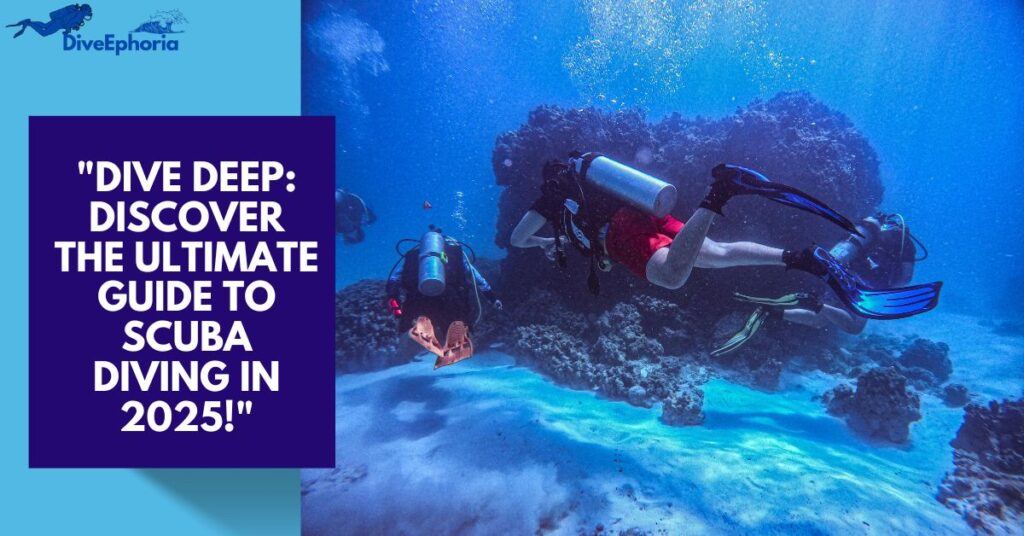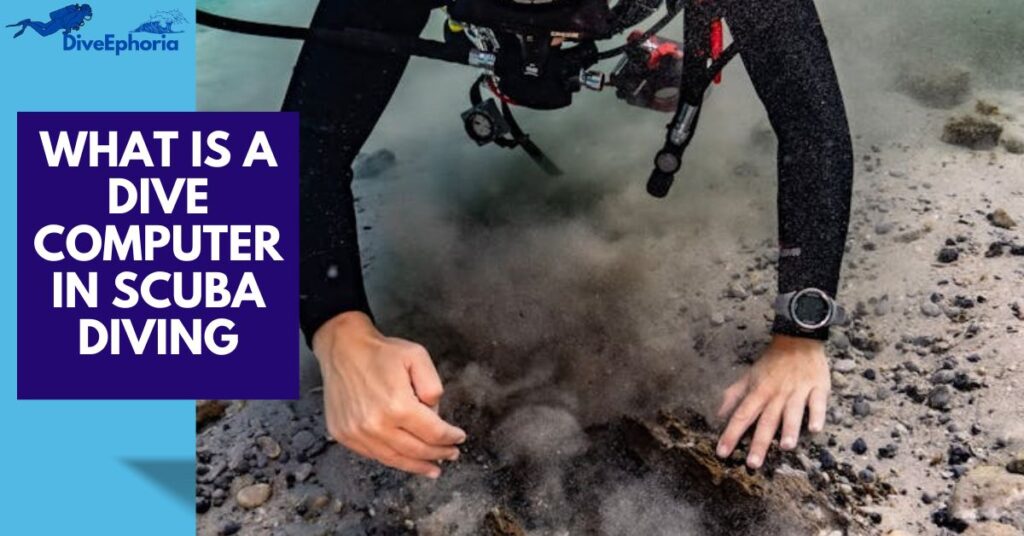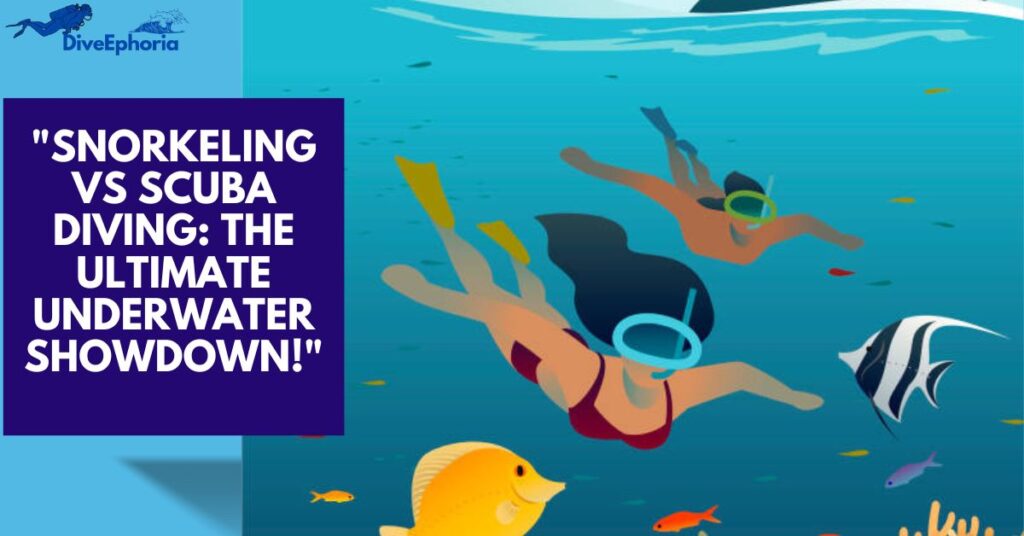
Introduction
Exploring the underwater world is a dream for many, but choosing how to experience it can be confusing. With so many options, you might find yourself asking: Should I try snorkeling or scuba diving? Both activities offer incredible ways to see marine life up close, yet they differ greatly in skill requirements, equipment, and the kind of adventure you’ll have. This confusion often leaves beginners unsure about which activity to pick—leading to hesitation or even missed opportunities for unforgettable experiences.
If you’re facing this dilemma, you’re not alone. The good news is, by understanding the key differences between snorkeling and scuba diving, you can make an informed choice that fits your interests, comfort level, and goals. Whether you’re looking for a casual, easy introduction to underwater exploration or an immersive dive into the depths, this guide will break down everything you need to know. By the end, you’ll be ready to decide which underwater adventure is right for you.
Table of Contents
What is Snorkeling?
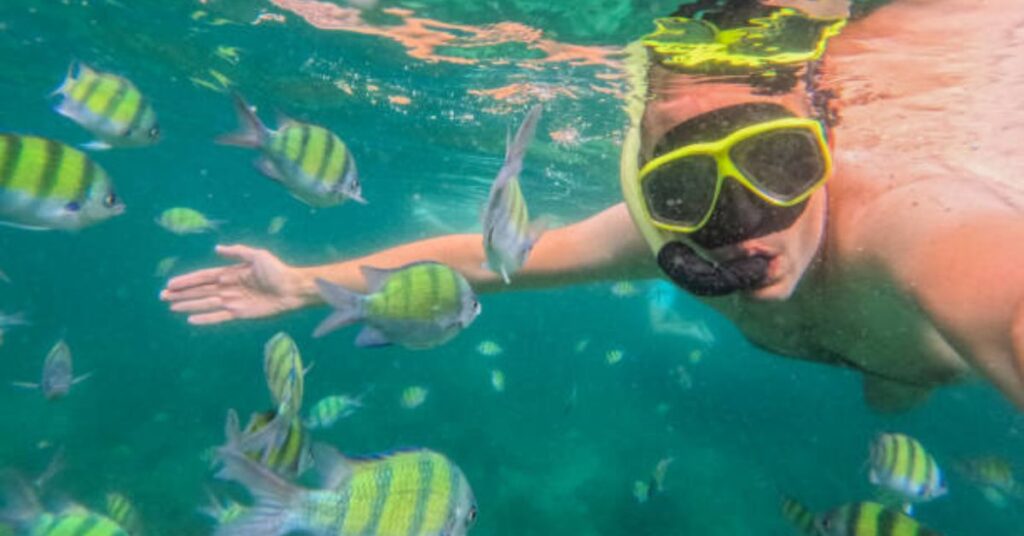
Snorkeling is one of the easiest and most enjoyable ways to explore the underwater world, perfect for beginners and casual adventurers. It involves swimming near the water’s surface while wearing a mask to see clearly underwater, a snorkel tube to breathe without lifting your head, and fins to help you glide smoothly. Because snorkeling requires minimal equipment and no formal training, it’s accessible to almost everyone—whether you’re a first-time ocean explorer or just looking for a relaxing way to discover marine life.
Key Features of Snorkeling:
- Equipment: A snorkeling set typically includes a snorkel (breathing tube), a clear mask that seals around your eyes and nose, and fins for better swimming efficiency. Many snorkelers also wear life vests or flotation devices for added safety and comfort.
- Depth: Snorkeling stays mainly at the water’s surface or just below it, allowing you to observe shallow coral reefs, colorful fish, and other marine creatures in their natural habitat without diving deep.
- Training: Snorkeling requires minimal to no formal training, making it an ideal activity for beginners, children, or those who want a simple way to enjoy the ocean. Basic swimming skills are helpful but not mandatory, especially with flotation aids.
- Cost: Snorkeling is very budget-friendly since the gear is affordable and widely available for rent or purchase, and no certification courses are necessary.
Who is Snorkeling Best For?
- Beginners and Non-Swimmers: Because snorkeling is low risk and easy to learn, it’s perfect for people new to water sports or those who want a gentle introduction to underwater exploration.
- Families with Kids: Snorkeling is a safe and fun activity for children and parents to enjoy together, especially in calm, shallow waters.
- Travelers and Casual Explorers: If you’re visiting tropical destinations with coral reefs, lagoons, or marine parks, snorkeling offers a quick and rewarding way to see vibrant sea life without the commitment of scuba diving.
- Anyone Interested in Relaxed, Surface-Level Viewing: Snorkeling suits those who want to stay near the surface and take in the underwater scenery at a leisurely pace.
What is Scuba Diving?
Scuba diving takes underwater exploration to a whole new level, allowing you to dive deeper and stay submerged longer using advanced breathing equipment. Unlike snorkeling, scuba diving involves using a self-contained underwater breathing apparatus (scuba), including a tank of compressed air, a regulator to control airflow, and a buoyancy control device (BCD) to manage your position in the water. This gear enables divers to experience vibrant coral reefs, underwater caves, shipwrecks, and marine life in ways impossible from the surface.
Key Features of Scuba Diving:
- Equipment: Scuba diving requires more specialized gear compared to snorkeling, including a scuba tank filled with compressed air, a regulator that lets you breathe underwater, a mask, fins, a BCD to help control your buoyancy, and often a wetsuit or drysuit to protect against temperature changes. Additional accessories can include dive computers, underwater cameras, and safety equipment.
- Depth: Scuba divers can explore depths ranging from 10 meters (33 feet) for beginners to over 30 meters (100 feet) or more for advanced divers. This allows access to underwater environments that snorkeling cannot reach, revealing deeper coral reefs, diverse marine ecosystems, and fascinating underwater structures.
- Training: Because scuba diving involves breathing underwater and managing complex equipment, it requires formal certification through recognized courses such as PADI (Professional Association of Diving Instructors) or SSI (Scuba Schools International). These courses teach essential safety skills, equipment use, and dive planning.
- Cost: Scuba diving is more expensive due to the cost of certification courses, rental or purchase of specialized gear, and dive trips that often require boats and professional guides.
Who is Scuba Diving Best For?
- Adventure Seekers: If you crave excitement and want to explore beyond the shallow waters, scuba diving offers thrilling opportunities to encounter unique marine life and underwater landscapes.
- Experienced Swimmers and Divers: Individuals comfortable in the water who enjoy mastering new skills will find scuba diving rewarding and challenging.
- Travelers Interested in Specialized Diving: Scuba diving opens the door to experiences like wreck diving, underwater photography, night dives, and cave exploration.
- Those Seeking Immersive Marine Experiences: Scuba diving allows for longer underwater exploration, giving you time to fully immerse yourself in the underwater world’s beauty and tranquility.
Snorkeling vs Scuba Diving: Key Differences
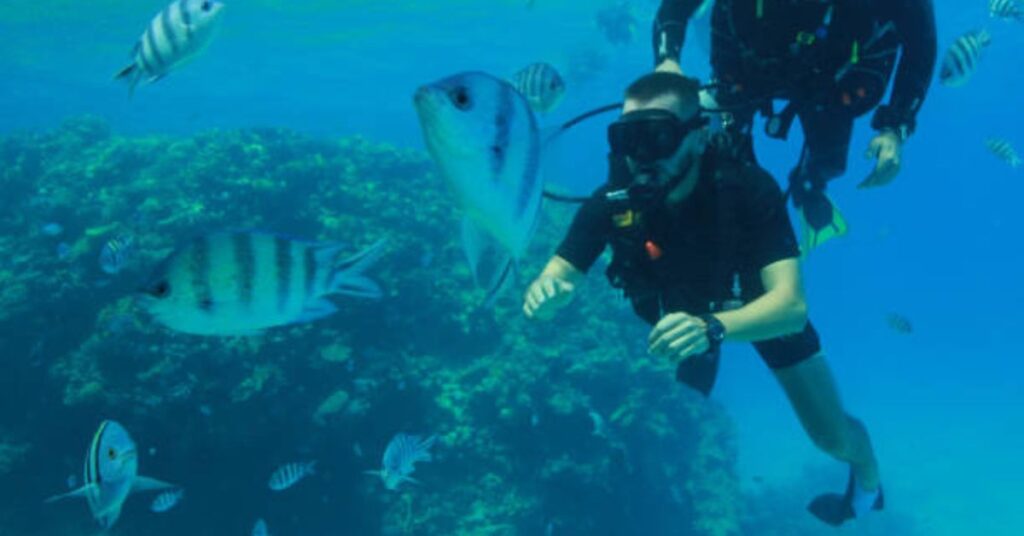
When deciding between snorkeling and scuba diving, understanding their fundamental differences helps you choose the right underwater adventure for your needs. From equipment and depth capabilities to training requirements and cost, each activity offers distinct experiences tailored to different interests and skill levels. Here’s a detailed comparison of the key differences between snorkeling and scuba diving:
1. Depth
- Snorkeling: Snorkeling is primarily a surface-level activity. When snorkeling, you stay at or just below the water’s surface, using your snorkel to breathe while observing marine life in shallow waters. This makes snorkeling ideal for exploring coral reefs, tide pools, and coastal areas where underwater sights are visible from the top. However, your underwater exploration is limited to about 1 to 2 meters (3 to 6 feet) deep, so you won’t be able to experience the underwater world beyond the surface.
- Scuba Diving: Scuba diving offers the incredible advantage of exploring much deeper underwater environments. Depending on your certification level, scuba diving can take you anywhere from 18 meters (60 feet) to depths over 40 meters (130 feet). This ability to dive deep opens up the possibility to explore coral walls, underwater caves, shipwrecks, and diverse ecosystems far beyond the reach of snorkelers.
2. Equipment
- Snorkeling: Snorkeling requires minimal and easy-to-use equipment, making it beginner-friendly and affordable. The essential gear includes a snorkel tube for breathing, a mask to see clearly underwater, and fins to help propel yourself smoothly. Some snorkelers also wear a lightweight life vest for extra buoyancy and safety. Because the equipment is simple, snorkeling gear is widely available for purchase or rental at beaches and resorts.
- Scuba Diving: Scuba diving requires much more advanced and specialized equipment. A typical scuba setup includes a compressed air tank, a regulator to breathe from the tank, a buoyancy control device (BCD) to maintain neutral buoyancy underwater, a mask, fins, and often a wetsuit to protect against cold temperatures. Additional accessories like dive computers, gauges, and underwater cameras enhance safety and enjoyment but also add to the complexity. The gear requires proper maintenance and training to use safely.
3. Training
- Snorkeling: One of snorkeling’s biggest advantages is its ease of access—you don’t need formal training or certification. Most people can pick up snorkeling basics quickly with a short introduction or even just by watching a tutorial. Basic swimming skills are helpful but not mandatory, especially if using flotation devices. This makes snorkeling a perfect entry point for all ages and skill levels to enjoy underwater exploration safely.
- Scuba Diving: Scuba diving requires formal training and certification before you can dive independently. Popular certifications include PADI Open Water Diver and SSI Open Water Diver courses, which teach essential skills such as equipment use, underwater communication, safety procedures, and emergency management. Training also covers dive planning and understanding the effects of pressure and breathing compressed air underwater. Certification ensures divers have the knowledge and confidence to dive safely and responsibly.
4. Accessibility
- Snorkeling: Snorkeling is widely accessible and available almost everywhere with suitable water conditions—from tropical beaches to freshwater lakes. Since it requires minimal gear and no certification, you can start snorkeling spontaneously or join guided snorkeling tours with ease. It’s a great choice for travelers and casual water enthusiasts who want quick and easy underwater experiences.
- Scuba Diving: Scuba diving requires more preparation and planning. Besides the necessary certification, divers often need to arrange for specialized gear rental or bring their own equipment. Access to dive sites may require boats or diving centers, and dives are usually done with a certified dive buddy or instructor for safety reasons. This makes scuba diving less spontaneous but more rewarding for those who invest the time and effort.
5. Cost
- Snorkeling: Snorkeling is generally a low-cost activity. Basic snorkeling sets are affordable to buy or rent, and there are no expensive training or certification fees. For budget-conscious travelers or families, snorkeling offers an economical way to enjoy the underwater world without breaking the bank.
- Scuba Diving: Scuba diving involves higher costs due to several factors—certification courses can range from hundreds to over a thousand dollars depending on the level, and gear purchase or rental adds to expenses. Dive trips, especially in remote or exotic locations, may include boat fees, guide services, and accommodation costs. While scuba diving is an investment, many find the unforgettable underwater experiences and skills learned to be well worth the price.
Which is Safer: Snorkeling or Scuba Diving?
When it comes to safety, both snorkeling and scuba diving are generally safe activities—provided you follow recommended precautions and guidelines. However, each has its own risk factors due to the nature of the activity and equipment involved. Understanding these differences can help you choose the right activity based on your comfort level and experience.
Snorkeling Safety
Snorkeling is widely regarded as one of the safest water activities, especially for beginners and families. Because it is done at the surface of the water, there is less risk of serious underwater hazards. However, there are still a few safety concerns to keep in mind:
- Simplicity: The minimal equipment and surface-level nature make snorkeling less complex and reduce the chance of dangerous situations.
- Common Risks: Snorkelers may face risks such as sunburn from prolonged exposure to the sun, dehydration, muscle cramps from swimming, or fatigue if swimming too far from shore.
- Water Conditions: Strong currents, waves, or poor visibility can increase risks, so it’s important to snorkel in safe, calm waters and stay aware of your surroundings.
- Precautions: Wearing sunscreen, staying hydrated, using a flotation device if needed, snorkeling with a buddy, and avoiding risky areas can help ensure a safe experience.
Scuba Diving Safety
Scuba diving involves more complexity and potential risks due to the deeper underwater environment and use of specialized gear. However, when done properly, it remains a safe and controlled activity:
- Training and Certification: One of the biggest safety advantages in scuba diving is the mandatory training and certification process. These courses teach divers how to manage equipment, recognize signs of danger, handle emergencies, and dive within safe limits.
- Potential Risks: Scuba divers face risks such as decompression sickness (also called “the bends”), nitrogen narcosis, equipment malfunctions, and drowning if safety protocols aren’t followed.
- Risk Minimization: Following dive tables or using dive computers, maintaining proper ascent rates, performing safety stops, and diving within certified limits greatly reduce risks.
- Equipment Checks: Regular maintenance and thorough pre-dive checks of scuba gear ensure reliable operation underwater.
- Dive Buddy System: Diving with a trained partner and communicating clearly are essential for safety during every dive.
In summary, snorkeling is generally safer and more beginner-friendly due to its simplicity and surface-level nature, making it a great choice for those new to underwater exploration. Scuba diving, while involving more risks, becomes very safe when proper training, equipment checks, and safety procedures are followed. Whichever activity you choose, respecting the ocean and your own limits is key to an enjoyable and secure underwater adventure.
Popular Destinations for Snorkeling vs Scuba Diving
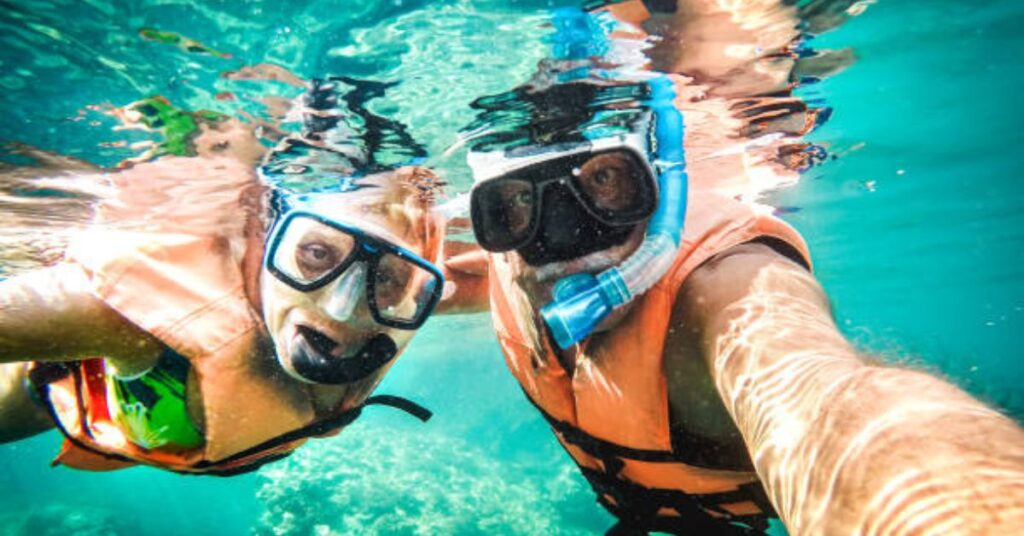
Choosing the perfect destination can greatly enhance your underwater experience, whether you’re snorkeling or scuba diving. Some locations offer ideal conditions and breathtaking marine life for both activities, while others cater more specifically to either snorkeling or scuba diving enthusiasts. Here’s a closer look at some of the world’s most popular snorkeling and scuba diving hotspots, including the famous Great Barrier Reef.
Snorkeling Hotspots
- Maldives: Renowned for its crystal-clear turquoise lagoons and vibrant coral reefs, the Maldives is a snorkeling paradise. Shallow reefs teeming with colorful fish, sea turtles, and rays make it ideal for snorkelers of all levels.
- Great Barrier Reef, Australia: The world’s largest coral reef system offers extensive shallow sections perfect for snorkeling. You can spot an incredible variety of marine life like clownfish, giant clams, and sea turtles just beneath the surface.
- Cabo San Lucas, Mexico: Known for its calm bays and rich marine biodiversity, Cabo San Lucas is a top destination for beginner snorkelers. Easy access to underwater rock formations and fish-filled waters makes it perfect for family outings.
- Goa, India: Goa’s calm coastal waters and coral gardens create a safe and enjoyable environment for snorkeling. It’s a lesser-known snorkeling spot offering peaceful underwater views of tropical fish and sea flora.
Scuba Diving Hotspots
- Great Barrier Reef, Australia: Beyond snorkeling, the Great Barrier Reef is a bucket-list destination for scuba divers worldwide. Dive into deeper sections to explore vibrant coral walls, underwater caves, and encounter large marine species like reef sharks, manta rays, and turtles.
- Maldives: Famous for thrilling drift dives along its atolls, the Maldives offers scuba divers rich coral gardens and encounters with pelagic species like whale sharks and manta rays. The warm, clear waters make it an unforgettable dive destination.
- Maui, Hawaii: Maui boasts diverse scuba diving experiences including famous wreck dives and sites known for green turtle sightings. Its volcanic underwater landscape adds to the dramatic and unique dive environments.
- Goa, India: Goa is emerging as a fascinating scuba diving destination with its underwater wrecks, caves, and a rich variety of marine life. Certified divers can enjoy exploring deeper waters beyond the snorkeling zones.
Each of these destinations offers unique underwater adventures suited to different skill levels and preferences. Whether you prefer the relaxed surface exploration of snorkeling or the immersive depths of scuba diving, these locations provide incredible opportunities to discover the beauty of marine ecosystems worldwide.
Snorkeling vs Scuba Diving for Non-Swimmers
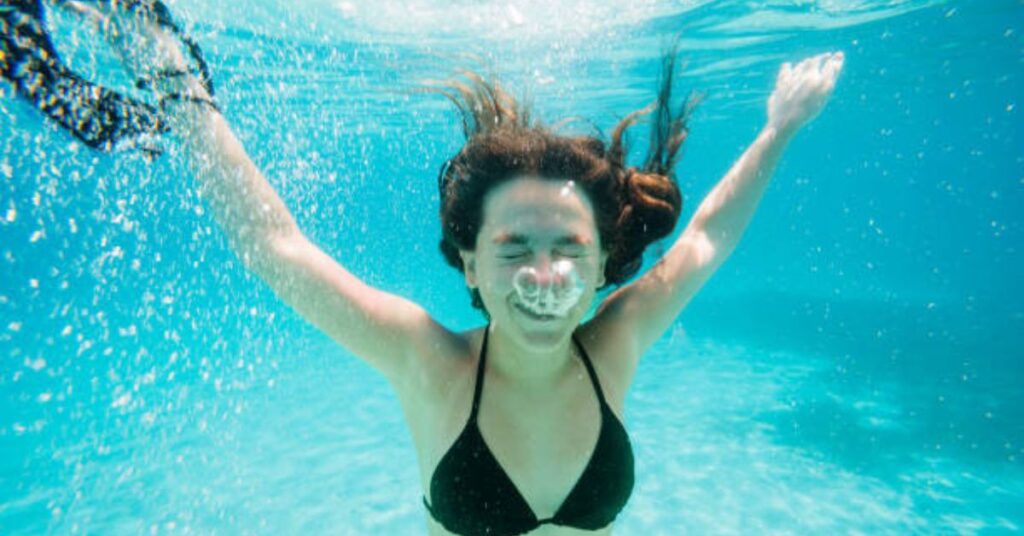
For individuals who are not confident swimmers or have little experience in the water, choosing the right underwater activity is essential for both safety and enjoyment. When it comes to snorkeling versus scuba diving, the two activities differ significantly in their suitability for non-swimmers.
Snorkeling: The Safer and More Accessible Option for Non-Swimmers
Snorkeling is widely regarded as a safe and accessible water activity for non-swimmers, especially when certain safety measures are in place. Because snorkeling primarily takes place at the water’s surface, and the equipment is simple to use, it allows non-swimmers to comfortably explore shallow waters with minimal risk.
- Use of Life Vests: Non-swimmers can wear life vests or snorkeling floatation devices to provide extra buoyancy and keep them afloat effortlessly. This support helps build confidence and ensures they can breathe easily through the snorkel without worrying about sinking.
- Calm Water Environments: Many snorkeling spots, such as calm lagoons and protected bays, offer gentle water conditions, making it even safer for non-swimmers to enjoy the experience.
- Minimal Physical Demands: Since snorkeling doesn’t require deep diving or complex breathing techniques, non-swimmers can participate without needing advanced swimming skills or training.
Scuba Diving: Not Recommended for Non-Swimmers
Scuba diving, on the other hand, is not generally recommended for non-swimmers or those uncomfortable in the water. Because scuba diving involves breathing underwater, managing complex equipment, and swimming at various depths, it requires a solid foundation of swimming ability and water confidence.
- Training and Certification: Before scuba diving independently, individuals must complete certification courses, which include swimming tests and water skill requirements. Non-swimmers typically find these prerequisites challenging.
- Safety Risks: Diving without adequate swimming skills can increase risks such as panic underwater, difficulty managing equipment, or trouble ascending safely. Proper training and comfort in the water are essential to minimize these risks.
- Alternative Options: For non-swimmers eager to explore underwater, introductory programs like “Discover Scuba Diving” often offer shallow, controlled environments with professional supervision. However, even these require some water comfort and swimming ability.
In summary, snorkeling is the ideal underwater activity for non-swimmers, offering a safe, enjoyable way to experience marine life with minimal physical demands and no formal training needed. Scuba diving requires strong swimming skills and training, making it best suited for those comfortable in the water and willing to invest time in certification
Practical Tips for Choosing Between Snorkeling and Scuba Diving
Deciding whether to try snorkeling or scuba diving depends on several personal factors, including your comfort level, budget, and what kind of underwater experience you’re seeking. To help you make the best choice, here are some practical tips to guide your decision:
1. Consider Your Comfort Level in Water
- If You’re New or Hesitant: If you feel nervous about being fully submerged or managing complicated equipment underwater, snorkeling is the perfect place to start. It allows you to stay at the surface, breathe easily through a snorkel, and observe marine life with minimal pressure. Snorkeling helps build confidence in the water without the need to dive deep.
- If You’re Adventurous and Confident: If you’re excited by the idea of exploring deeper waters and want a more immersive underwater experience, scuba diving may be the right choice. Pursuing scuba certification through reputable organizations like PADI or SSI will equip you with the skills and knowledge to dive safely and confidently.
2. Assess Your Budget
- Snorkeling: Generally, snorkeling is a budget-friendly activity. Basic equipment such as a mask, snorkel, and fins can be purchased inexpensively or rented at most beach destinations. Since there’s no need for formal training, you can enjoy snorkeling almost immediately without extra costs.
- Scuba Diving: Scuba diving involves a higher financial investment. Certification courses can be costly, ranging from a few hundred to over a thousand dollars depending on the level and location. Additionally, specialized gear, dive trips, and ongoing equipment maintenance add to the expense. Consider your budget carefully before committing.
3. Think About Your Goals
- Casual Marine Exploration: If your goal is to enjoy a relaxing day observing colorful fish, coral reefs, and shallow marine habitats, snorkeling offers the ideal experience. It’s easy to learn, low-risk, and perfect for short excursions.
- Immersive Underwater Adventure: For those who want to explore shipwrecks, underwater caves, or interact with larger marine animals in their natural habitat, scuba diving offers unparalleled access and freedom. Diving deeper allows you to discover hidden underwater wonders beyond the reach of snorkelers.
Conclusion: Snorkeling vs Scuba Diving—Which is Better?
Both snorkeling and scuba diving provide amazing opportunities to discover the vibrant underwater world, but the best choice depends on your interests, skill level, and budget.
Snorkeling is perfect for beginners, families, and casual explorers who want an easy, affordable way to experience marine life right at the water’s surface. It requires minimal equipment, no formal training, and is accessible in countless beautiful locations worldwide. Whether you’re vacationing in tropical lagoons or coastal reefs, snorkeling offers a fun and safe way to enjoy stunning underwater views.
Scuba diving, however, is best suited for adventure seekers and those eager to dive deeper into the ocean’s mysteries. With proper training and certification, scuba diving unlocks immersive encounters with diverse marine species, underwater landscapes, wrecks, and caves. Though it requires a greater investment in time, money, and preparation, the rich and thrilling experiences make scuba diving a truly unforgettable underwater journey.
Ultimately, whether you choose snorkeling or scuba diving, both activities connect you to the incredible marine ecosystem and offer unique memories beneath the waves. Consider your comfort level, budget, and personal goals to select the perfect underwater adventure that fits you best.
FAQs About Snorkeling vs Scuba Diving
What is the main difference between snorkeling and scuba diving?
Snorkeling is surface-level exploration, while scuba diving allows you to dive deep underwater using specialized equipment.
Can non-swimmers try snorkeling or scuba diving?
Non-swimmers can snorkel with a life vest. Scuba diving typically requires basic swimming skills.
Is scuba diving more dangerous than snorkeling?
Scuba diving involves more risks due to the depth and equipment but is safe with proper training.
Which is better for exploring the Great Barrier Reef: snorkeling or scuba diving?
Both are excellent, but scuba diving offers a more immersive experience for viewing deeper coral formations.
What is more affordable: snorkeling or scuba diving?
Snorkeling is generally more affordable than scuba diving.

